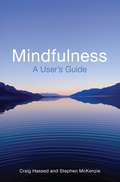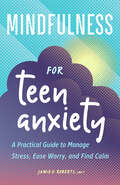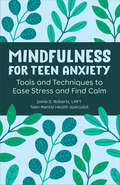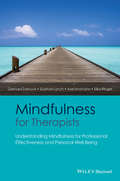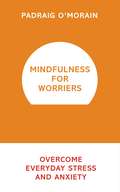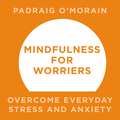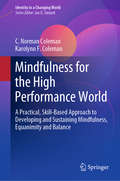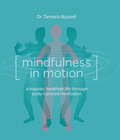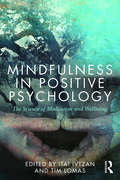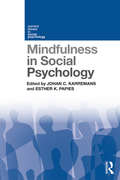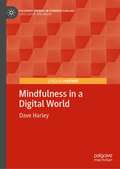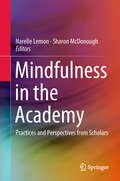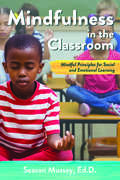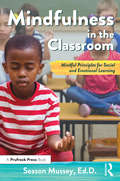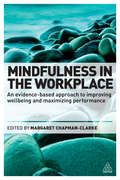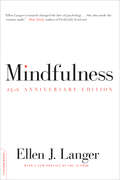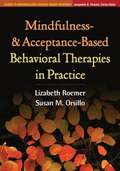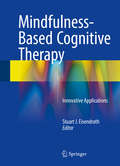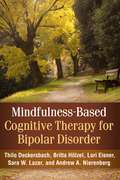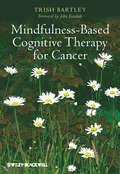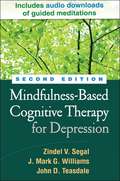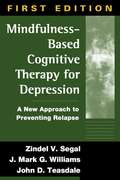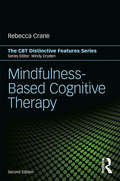- Table View
- List View
Mindfulness for Life: How to Use Mindfulness Meditation to Improve Your Life
by Craig Hassed Stephen McKenzieMany of us in the modern world are unhappier than they need to be, and mindfulness offers a solution that works. Science and clinical practice have only recently 'discovered' the profound potential of mindfulness-based practices for increasing our wellbeing. However, mindfulness has been practised for thousands of years as an attention-training technique that can reduce physical and psychological suffering and enhance health and happiness. Derived from ancient contemplative practices in many cultures and wisdom traditions, mindfulness practice simply involves directing our attention to what is (reality), rather than to what isn't (our ideas of reality).Mindfulness for Life is written by two experts on mindfulness with many years of personal and clinical experience. The authors have come together to provide both a medical and a psychological perspective on mindfulness and related conditions such as depression and substance abuse. The result is a book that translates the scientific principles underlying mindfulness into a simple, practical and accessible life manual.
Mindfulness for Teen Anxiety: A Practical Guide to Manage Stress, Ease Worry, and Find Calm
by Jamie D. Roberts LMFTHelp teens soothe their anxiety with the power of mindfulness Show teens how changing the way they think about their problems can help them overcome their worries. This anxiety-busting guide introduces teens to the concept of mindfulness—the practice of being present in the here and now—and teaches them how they can use it to feel calmer and more in control. What sets this guide to mindfulness for teens apart: Anxiety basics—Teens will discover a basic overview of anxiety: what it is, where it comes from, and how it affects them. Mindfulness made simple—This teen anxiety book has a simple, supportive format that makes it easy for them to experience the benefits of mindfulness throughout their day. A variety of exercises—From short quizzes to creative activities, this book is filled with exercises to help teens be more present, check in on themselves, and change their thoughts. Empower teens to live happier through mindfulness with this anxiety workbook for teens.
Mindfulness for Teen Anxiety: Tools and Techniques to Ease Stress and Find Calm
by Jamie D. Roberts LMFTSoothe your anxiety with the power of mindfulness—a supportive workbook for teensWhen you start to feel worried or overwhelmed, mindfulness is a powerful way to stop that anxiety in its tracks. This guide to mindfulness for teens shows you how to stay calm and focus on the moment, so you can clear your mind and take control of any challenge.What is anxiety? — Get an overview of where anxiety comes from and how it affects your brain and body — so you can recognize and understand your anxious feelings.Mindfulness for every day — Learn how these mindfulness techniques can help you conquer anxiety about everything from friends and peer pressure to your grades, self-confidence, and plans for the future.Lots of tools to try — From short quizzes to creative activities, this book is filled with exercises to help you check in with yourself, think more positive thoughts, and build up your self-esteem.Feel happier and more confident when you use the skills in Mindfulness for Teen Anxiety.
Mindfulness for Therapists
by Silka Ringer Siobhan Lynch Gerhard Zarbock Axel AmmannMindfulness for Therapists presents an innovative eight-week mindfulness protocol designed to aid therapists--which may be worked through alone or in small groupsPresents the first complete mindfulness program designed to improve the personal and professional well-being and effectiveness of therapists themselvesFeatures an 8-week introduction to mindfulness in the form of exercises designed to help therapists develop their own meditation practice and apply it to their livesIntegrates key research that includes the Five Facets of Mindfulness, the Three-Person-Perspectives approach, and the neurobiological foundations of mindfulness trainingSupported by online meditations and exercises for therapists
Mindfulness for Therapists: Practice for the Heart
by Eric E. McCollumMindfulness for Therapists: Practice for the Heart encourages therapists to embrace mindfulness practice to create presence and depth in their work with clients. Mindfulness helps therapists cultivate compassion, relieve stress, and weather the often emotionally difficult work of providing therapy. In addition, the therapist's own meditation practice is a necessary foundation for teaching mindfulness to clients. Through a variety of exercises and stories from his own clinical experience, McCollum helps therapists understand the usefulness of mindfulness, and develop their own practice.
Mindfulness for Worriers: Overcome Everyday Stress and Anxiety
by Padraig O'MorainThis accessible book provides readers with mindfulness-based techniques to reduce worry, anxiety, stress and panic attacks. It will help readers deal with anxiety-inducing episodes by learning to accept and overcome strong emotions without getting caught up in negative and damaging thoughts.Aimed at anyone who is stressed or anxious, as well as people suffering from more extreme levels of anxiety, the book will provide the scientific evidence behind the effectiveness of mindfulness as well as lots of practical advice on how to quiet an anxious, racing mind.
Mindfulness for Worriers: Overcome Everyday Stress and Anxiety
by Padraig O'MorainThis accessible book provides readers with mindfulness-based techniques to reduce worry, anxiety, stress and panic attacks. It will help readers deal with anxiety-inducing episodes by learning to accept and overcome strong emotions without getting caught up in negative and damaging thoughts.Aimed at anyone who is stressed or anxious, as well as people suffering from more extreme levels of anxiety, the book will provide the scientific evidence behind the effectiveness of mindfulness as well as lots of practical advice on how to quiet an anxious, racing mind.(P)2015 Hodder & Stoughton
Mindfulness for the High Performance World: A Practical, Skill-Based Approach to Developing and Sustaining Mindfulness, Equanimity and Balance (Identity in a Changing World)
by C. Norman Coleman Karolynn F. ColemanMindfulness for the High Performance World provides a unique approach to mindfulness training, built upon the principles of Buddhist philosophy written in line with the Dalai Lama’s description of meditation and mindfulness as “Science of the Mind”. This unique volume explores mindfulness as a learnable skill in context with the underpinnings of the teachings of Eastern psychology.The authors, Norm, a physician, cancer researcher and triathlete and Karolynn, a psychotherapist, mindfulness meditation teacher and marathoner, live and work in a high-stress, high-expectation world. Their approach is rooted in an understanding that thoughts produce biochemical and physiological changes and provides a strategic framework to instruct an individual on how to categorize types of thoughts. After harnessing this ability, one is positioned to become both more aware of his or her thoughts as well as the specific patterns of sensations they produce, or Sentinel Sites℠. The awareness of what the mind is doing and the ability to interrupt a thought pattern and/or control the response almost instantly leads one to having a healthier life, improved relationships with others and better adaptability to one’s environment. Emphasizing the importance of physical activity and nutrition, the authors present a systematic approach for people who want to learn and incorporate mindfulness and transform how they live without having to divert their lives and careers. Offering itself as an accessible and skill-based introduction to the principles, practices, and benefits of mindfulness, Mindfulness for the High Performance World is a useful resource for students, athletes and professionals living and working in high-performance, high-stress environments and also for mindfulness practitioners seeking to deepen their skill level.
Mindfulness in Motion
by Tamara RussellDiscover a life of ease and joy through movement-based mindfulness Mindfulness in Motion presents the Body in Mind Training programme: a truly groundbreaking new approach to mindfulness that is practised not by sitting still but by engaging with the moving body. Written by neuroscientist and mindfulness expert Dr Tamara Russell, this is the only book on mindfulness to explain exactly why moving meditation is the best way of 'rewiring' the brain, teaching it to focus on the present moment. Her simple exercises are designed to be accessible to everyone, including those who can't seem to find time for practice, and those who have struggled with traditional Zen-inspired mindfulness, with its emphasis on sitting meditation. This book will guide you step by step through Dr Tamara Russell's Body in Mind Training (BMT) programme, a unique approach to secular mindfulness that uses the moving body as the main meditation tool. The message is simple: getting out of your head and into your body is the key to a happier, healthier life. Chapter by chapter the book explores the five principles of movement-based mindfulness: PAUSE In order to hear your body you have to slow down and listen to its voice - this is the starting point for BMT mindfulness practice. INTENTION Setting your intention before you act can dramatically increase your ability to achieve what you want in life. ATTENTION You can detect the mind-wandering habits that hold you back and use your attention to create more space for the things that really matter. UNDERSTANDING ME It's possible to tame your unruly 'mental monkeys' and create new neural pathways in your brain to help you to realize your full potential. COMPASSION Facing and accepting your own difficult experiences can profoundly transform your relationship with life. With easy-to-follow exercises, step-by-step photographs, clear brain diagrams and a host of practical tips, this book offers all the tools you need to start living in your body. With a little focus, determination and practice, you too can experience the amazing benefits of mindfulness!From the Trade Paperback edition.
Mindfulness in Positive Psychology: The Science of Meditation and Wellbeing
by Itai Ivtzan Tim LomasMindfulness in Positive Psychology brings together the latest thinking in these two important disciplines. Positive psychology, the science of wellbeing and strengths, is the fastest growing branch of psychology, offering an optimal home for the research and application of mindfulness. As we contemplate mindfulness in the context of positive psychology, meaningful insights are being revealed in relation to our mental and physical health. The book features chapters from leading figures from mindfulness and positive psychology, offering an exciting combination of topics. Mindfulness is explored in relation to flow, meaning, parenthood, performance, sports, obesity, depression, pregnancy, spirituality, happiness, mortality, and many other ground-breaking topics. This is an invitation to rethink about mindfulness in ways that truly expands our understanding of wellbeing. Mindfulness in Positive Psychology will appeal to a readership of students and practitioners, as well as those interested in mindfulness, positive psychology, or other relevant areas such as education, healthcare, clinical psychology, counselling psychology, occupational psychology, and coaching. The book explores cutting edge theories, research, and practical exercises, which will be relevant to all people interested in this area, and particularly those who wish to enhance their wellbeing via mindfulness.
Mindfulness in Social Psychology
by Esther K. Papies Johan C. KarremansScientific interest in mindfulness has expanded in recent years, but it has typically been approached from a clinical perspective. This volume brings recent mindfulness research to classic social psychology topics such as romantic relationships, prejudice, prosocial behavior, achievement, and self-control. Written by renowned scholars in social psychology, it combines a comprehensive research overview with an in-depth analysis of the processes through which mindfulness affects people’s daily life experiences. It provides theoretical and methodological guidance for researchers across disciplines and discusses fundamental processes in mindfulness, including its effect on emotion regulation, executive control, automatic and deliberative processing, and its relationship to self-construal and self-identity. This book will be of particular interest to upper-level students and researchers in social psychology, health psychology, and clinical psychology, as well as social work and psychology professionals.
Mindfulness in a Digital World (Palgrave Studies in Cyberpsychology)
by Dave HarleyUsing a lens of mindfulness, this book explores how digital dependencies can displace attention and undermine attentional control, leading to experiences of stress and mindless involvement with digital technology. Using qualitative interviews with teachers and students of mindfulness programmes, the book explores the challenges and opportunities for reconciling digital interactions with mindful practice. A phenomenological analysis of participants’ digital experiences shows three different imperatives (relating to digital capabilities, hyper-reality and algorithms), that can drive unconscious forms of interaction and encourage a delegation of attentional control that draws users away from the present moment. The book concludes by exploring the implications of these (extra-conscious) imperatives for understanding digital addiction. It also provides a set of guidelines for a digital approach to mindfulness practice that can encourage beneficial relationships with digital technology into the future.
Mindfulness in the Academy: Practices And Perspectives From Scholars
by Narelle Lemon Sharon McDonoughThis book focuses on the way academics understand, embrace and enact the concepts of mindfulness in approaching their work in demanding and dynamic contemporary higher education environments. It examines how they implement formal and informal mindfulness practices that increase the capacity to transform mind and body states by drawing on concepts such as compassion, kindness, gratitude, curiosity, self-awareness and non-judgemental stances. The book provides insights into and highlights the struggles of scholars through their experiences and perspectives in relation to their identities, practices and job enactment. Each chapter author explains their mindfulness practices and their motivations for implementing them, and explores how mindful ways of researching, writing, learning and teaching, leading, and engaging with others leads us to self-awareness and engagement in the present.
Mindfulness in the Classroom: Mindful Principles for Social and Emotional Learning
by Season MusseyMindfulness can be used in the classroom as a method to increase overall teacher effectiveness, raise student achievement, and reignite the joy of teaching and learning. "Mindfulness in the Classroom" introduces eight mindful principles that support social and emotional learning for teachers and students in today's schools, leading to increased empathy, kindness, self-awareness, integrity, self-control, and honesty. The book provides an introduction and theoretical overview of mindfulness, followed by a discussion of the eight mindful principles. Research-based evidence is presented alongside differentiated teaching activities and classroom examples, helping to bridge the gap from theory to practice. Larger implications for schools and society are also discussed, including a call to use these principles to teach the whole child. Mindfulness in the Classroom offers teachers and students a guide for the journey back to the heart of teaching and learning.
Mindfulness in the Classroom: Mindful Principles for Social and Emotional Learning
by Season MusseyMindfulness can be used in the classroom as a method to increase overall teacher effectiveness, raise student achievement, and reignite the joy of teaching and learning. Mindfulness in the Classroom introduces eight mindful principles that support social and emotional learning for teachers and students in today's schools, leading to increased empathy, kindness, self-awareness, integrity, self-control, and honesty. The book provides an introduction and theoretical overview of mindfulness, followed by a discussion of the eight mindful principles. Research-based evidence is presented alongside differentiated teaching activities and classroom examples, helping to bridge the gap from theory to practice. Larger implications for schools and society are also discussed, including a call to use these principles to teach the whole child. Mindfulness in the Classroom offers teachers and students a guide for the journey back to the heart of teaching and learning.
Mindfulness in the Workplace: An Evidence-based Approach to Improving Wellbeing and Maximizing Performance
by Margaret A. Chapman-ClarkeMindfulness-based interventions in organizations offer the potential to build individual and organizational resilience, engage employees and address workplace stress. Mindfulness in the Workplace is a practical guide written for practitioners who want to learn how mindfulness can be used as a change management and organizational development strategy. Drawing from the latest research evidence from neuro- and behavioural science, Mindfulness in the Workplace offers a framework and guidance on how to start evolution- not revolution- in the organization. It ensures the greatest chance of success, showing how to identify the key stakeholders and work with them on understanding the power of a mindfulness initiative, how to identify a mindfulness champion, adapt the language of mindfulness to the context of the organization, establish metrics, and measure return on investment. Mindfulness in the Workplace proposes that HR and OD professionals are best placed to understand the complexity of implementing change in organizational systems and, therefore, the practice of mindfulness need to be brought in-house, even if they bring in external mindfulness coaches to train their leaders. Case studies including Capital One Finance and the NHS Mental Health Trust cover the reasoning behind these initiatives, how they were planned, the barriers they faced, the lessons learned, and their results. This book offers a forum for HR and OD practitioners to hear from other practitioners who have implemented organizational mindfulness-based interventions using change management principles so that they can understand how they might be applied to their own practice and their own organizations.
Mindfulness, 25th Anniversary Edition (A Merloyd Lawrence Book)
by Ellen J. LangerEllen J. Langer, Harvard professor of psychology, determines that the mindless following of routine and other automatic behaviors lead to much error, pain and a predetermined course of life. In this thought-provoking book, her research has been "translated" for the lay reader. With anecdotes and metaphors, Langer explains how the mindless--as opposed to the mindful--develop mindsets of categories, associations, habits of thought born of repetition in childhood and throughout schooling. To be mindful, she notes, stressing process over outcome, allows free rein to intuition and creativity, and opens us to new information and perspectives. Langer discusses the negative impact of mindsets on business and social relations, showing special concern for the elderly, who often suffer from learned helplessness and lack of options. Encouraging the application of mindfulness to health, the author affirms that placebos and alternative, mind-based therapies can help patients and addicts move from unhealthy to healthy contexts.
Mindfulness- and Acceptance-Based Behavioral Therapies in Practice
by Lizabeth Roemer Susan OrsilloAccessible and practical, this book provides a unified framework for integrating acceptance and mindfulness into cognitive-behavioral practice. The authors interweave elements of acceptance and commitment therapy, mindfulness-based cognitive therapy, mindfulness-based relapse prevention, and dialectical behavior therapy. They demonstrate how to conduct an assessment, develop a case formulation, and derive a flexible treatment plan for each patient. Vivid case examples and transcripts illustrate the entire process of therapy, showing how treatment can be tailored for different presenting problems and concerns. More than two dozen reproducible handouts and forms are included.
Mindfulness-Based Cognitive Therapy
by Stuart J. EisendrathThis book brings together a cutting-edge selection of the most current applications of mindfulness-based cognitive therapy (MBCT), giving clinicians as well as researchers a concise guide to current and future directions. Each chapter begins with in illustrative case study to give readers an example of how MBCT would be used in the clinical setting, followed by an overview of the condition, the theoretical rationale for using MBCT, modifications of MBCT for that disorder, evidence for MBCT use. Chapters also discuss practical considerations of MBCT, including patient selection, home practice, group size, format, and facilitator training. Written by some of the world's leading physicians using MBCT, Mindfulness-Based Cognitive Therapy: Innovative Applications is of great value to psychiatrists, psychologists, social workers, and therapists.
Mindfulness-Based Cognitive Therapy for Bipolar Disorder
by Thilo Deckersbach Britta Hölzel Lori Eisner Sara W. Lazar Andrew A. NierenbergGrounded in current knowledge about bipolar disorder and its treatment, this book presents an empirically supported therapy program with step-by-step guidelines for implementation. Mindfulness-based cognitive therapy (MBCT) for bipolar disorder is specifically designed for clients who have experienced many mood episodes and who struggle with chronic, pervasive depressive and residual manic symptoms. The authors provide everything needed to conduct the 12 weekly group sessions, which are supplemented by regular individual sessions. Reproducible tools include 29 client handouts and an Instructor Checklist. Purchasers get access to a companion website featuring downloadable audio recordings of the guided mindfulness practices (meditations and mindful movement), plus the reproducible materials, ready to download and print in a convenient 8 1/2" x 11" size. A separate website for use by clients features the audio recordings only.
Mindfulness-Based Cognitive Therapy for Cancer
by Trish Bartley John TeasdaleMindfulness-based Cognitive Therapy for Cancer presents an eight-week course for MBCT which has been tried and tested over ten years of clinical use, and is targeted specifically for people with cancer. There is growing evidence of mindfulness as a successful and cost-effective intervention for reducing the negative psychological impact of cancer and treatment Draws upon the author's experience of working with people with cancer, and her own recent experience of using mindfulness with cancer diagnosis and treatmentStories from cancer patients illustrate the learning and key themes of the courseIncludes new short practices and group processes developed by the author
Mindfulness-Based Cognitive Therapy for Depression, Second Edition
by Zindel V. Segal J. Mark WilliamsThis bestselling work, now in a new edition, has introduced tens of thousands of clinicians to mindfulness-based cognitive therapy (MBCT) for depression, an eight-week program with proven effectiveness. Step by step, the authors explain the "whys" and "how-tos" of conducting mindfulness practices and cognitive interventions that have been shown to bolster recovery from depression and prevent relapse. Clinicians are also guided to practice mindfulness themselves, an essential prerequisite to teaching others. More than 40 reproducible handouts are included. Book purchasers get access to a companion Web page featuring downloadable audio recordings of the guided mindfulness practices (meditations and mindful movement), plus all of the reproducibles, ready to download and print in a convenient 8 1/2" x 11" size. A separate Web page for use by clients features the audio recordings only. New to This Edition Incorporates a decade's worth of developments in MBCT clinical practice and training. Chapters on additional treatment components the pre-course interview and optional full-day retreat. Chapters on self-compassion, the inquiry process, and the three-minute breathing space. Findings from multiple studies of MBCT's effectiveness and underlying mechanisms. Includes studies of adaptations for treating psychological and physical health problems other than depression. Audio files of the guided mindfulness practices, narrated by Dr. Segal, on two separate Web pages one for professionals, together with the reproducibles, and one just for clients. See also the related title for clients Many MBCT therapists recommend the bestselling self-help guide The Mindful Way through Depression (by Drs. Williams, Teasdale, Segal, and Kabat-Zinn) to their clients.
Mindfulness-Based Cognitive Therapy for Depression, Second Edition
by Jon Kabat-Zinn Zindel V. Segal John D. Teasdale J. Mark WilliamsThis bestselling work, now in a new edition, has introduced tens of thousands of clinicians to mindfulness-based cognitive therapy (MBCT) for depression, an eight-week program with proven effectiveness. Step by step, the authors explain the "whys" and "how-tos" of conducting mindfulness practices and cognitive interventions that have been shown to bolster recovery from depression and prevent relapse. Clinicians are also guided to practice mindfulness themselves, an essential prerequisite to teaching others. More than 40 reproducible handouts are included. Purchasers get access to a companion website featuring downloadable audio recordings of the guided mindfulness practices (meditations and mindful movement), plus all of the reproducibles, ready to download and print in a convenient 8 1/2" x 11" size. A separate website for use by clients features the audio recordings only. New to This Edition *Incorporates a decade's worth of developments in MBCT clinical practice and training. *Chapters on additional treatment components: the pre-course interview and optional full-day retreat. *Chapters on self-compassion, the inquiry process, and the three-minute breathing space. *Findings from multiple studies of MBCT's effectiveness and underlying mechanisms. Includes studies of adaptations for treating psychological and physical health problems other than depression. *Audio files of the guided mindfulness practices, narrated by the authors, on two separate Web pages--one for professionals, together with the reproducibles, and one just for clients. See also the authors' related titles for clients: The Mindful Way through Depression demonstrates these proven strategies in a self-help format, with in-depth stories and examples. The Mindful Way Workbook gives clients additional, explicit support for building their mindfulness practice, following the sequence of the MBCT program. Plus, for professionals: Mindfulness and the Transformation of Despair extends and refines MBCT for clients with suicidal depression.
Mindfulness-Based Cognitive Therapy for Depression: A New Approach to Preventing Relapse
by Zindel V. Segal John D. Teasdale J. Mark G. WilliamsSegal (psychotherapy, U. of Toronto), J. Mark G. Williams (clinical psychology, U. of Wales-Bangor) and John D. Teasdale (Medical Research Council's Cognition and Brain Sciences Unit, Cambridge, England) describe an approach to treating depression that combines the Eastern meditative practices and perspectives of mindfulness meditation, with the Western psychological epistemologies and practices of cognitive therapy. They speak to clinicians and researchers. Annotation c. Book News, Inc., Portland, OR (booknews.com)
Mindfulness-Based Cognitive Therapy: Distinctive Features (CBT Distinctive Features)
by Rebecca CraneThis new edition of Mindfulness-Based Cognitive Therapy: Distinctive Features (MBCT) provides a concise, straightforward overview of MBCT, fully updated to include recent developments. The training process underpinning MBCT is based on mindfulness meditation practice and invites a new orientation towards internal experience as it arises - one that is characterised by acceptance and compassion. The approach supports a recognition that even though difficulty is an intrinsic part of life, it is possible to work with it in new ways. The book provides a basis for understanding the key theoretical and practical features of MBCT and retains its accessible and easy-to-use format that made the first edition so popular, with 30 distinctive features that characterise the approach. Mindfulness-Based Cognitive Therapy: Distinctive Features will be essential reading for professionals and trainees in the field. It is an appealing read for both experienced practitioners and newcomers with an interest in MBCT.
